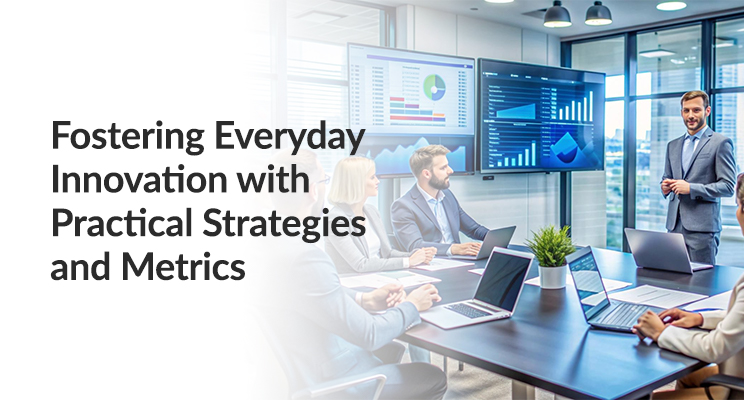Sustainability is now essential for businesses, driven by global challenges like climate change and resource scarcity. Achieving it requires more than big breakthroughs; it depends on everyday innovation and small, incremental changes that embed sustainable thinking into daily operations.
This blog explores why innovation is vital for sustainability and how businesses can foster a culture that transforms challenges into opportunities. By embracing sustainable practices, companies can not only adapt to change but also lead in building a thriving, sustainable future.
What is Everyday Innovation Culture?
Everyday innovation refers to the small, continuous improvements businesses can make in their processes, products, and services. Unlike groundbreaking technological advancements or industry-disrupting ideas, everyday innovation focuses on incremental changes that, when applied consistently, can create substantial long-term impacts. It’s not about reinventing the wheel but making it more efficient, sustainable, and aligned with modern challenges.
This concept shifts the narrative from innovation being the domain of experts in R&D departments to something every employee, team, or division can contribute. It recognizes that impactful changes often start small, with creative ideas emerging from everyday activities and operations.
Key Characteristics of Everyday Innovation
Practicality: Solutions that are easy to implement and fit seamlessly into current workflows.
Scalability: Small changes can be replicated across teams, branches, or markets.
Sustainability Focus: A deliberate intention to improve environmental and social outcomes alongside business performance.
Strategies to Foster Everyday Innovation for Sustainability
To integrate everyday innovation into a business’s DNA, organizations want to create an environment that encourages creative problem-solving, rewards sustainability-oriented thinking, and prioritizes collaborative efforts. Here are key strategies businesses can adopt to foster everyday innovation for a sustainable future.
Empower Teams and Foster a Culture of Innovation – Establish platforms for employees to voice their ideas, such as suggestion boxes, and brainstorming sessions on eco-friendly practices.
Offering Incentives – Reward innovative suggestions with recognition, bonuses, or public acknowledgement to encourage participation.
Leverage Technology for Sustainable Solutions – Use data to track resource usage, identify wasteful practices, and make informed decisions.
Embed Sustainability Goals into Business KPIs – Define specific sustainability targets that align with the company’s values and operational capabilities.
Engage Customers and Stakeholders – Create awareness campaigns to help customers make informed, sustainable choices.
Measuring the Impact of Innovation on Sustainability
Innovation aimed at sustainability is only as effective as its measurable results. To ensure that everyday innovations lead to meaningful outcomes, businesses must track their progress, evaluate their impact, and refine their strategies. This process highlights successes and identifies improvement areas, helping companies hold themselves accountable to their sustainability goals.
Define Clear Sustainability Metrics
The first step in sustainable measuring is identifying relevant and specific metrics that align with the organization’s sustainability objectives. These metrics can span environmental, social, and economic dimensions.
Ex: Energy consumption, Water usage and ROI on green innovations
Establish Benchmarks and Baselines
To assess progress, businesses must establish a baseline and initial measurement of key sustainability indicators before implementing innovations. Benchmarks can then be set to track performance over time.
Evaluate Tangible and Intangible Outcomes
Tangible Outcomes:
- Quantifiable resource savings or waste reduction.
- Financial benefits like cost reductions or increased revenue.
Intangible Outcomes:
- Enhanced employee morale due to participation in sustainability initiatives.
- Strengthen customer loyalty by aligning it with sustainability values.
Communicate Results to Stakeholders
- Publish annual or quarterly sustainability reports showcasing metrics and case studies.
- Use infographics, dashboards, or visual storytelling to make complex data accessible.
- Highlight both successes and lessons learned to show commitment to continuous improvement.
Continuously Refine and Adapt
- Use feedback from employees, customers, and stakeholders to inform refinements.
- Invest in research and development to explore new sustainable innovations.
- Scale successful initiatives across other parts of the business.
Use third-party certifications and standards
Partnering with reputable organizations to validate sustainability claims enhances credibility and provides benchmarks for continuous improvement.
Everyday innovation drives sustainability through small, consistent actions that create lasting change. By embedding this mindset into their culture, businesses can build resilience, adapt to evolving challenges, and unlock growth opportunities. This approach fosters practical, achievable steps that collectively transform industries and inspire progress.
As organizations champion sustainability through innovation, they empower employees, partners, and customers to contribute to a better future. Start small, think big, and innovate. The future of our planet and business depends on it.


